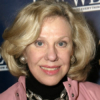Erica Jong

Erica Jong
Erica Jongis an American novelist and poet, known particularly for her 1973 novel Fear of Flying. The book became famously controversial for its attitudes towards female sexuality and figured prominently in the development of second-wave feminism. According to Washington Post, it has sold more than 20 million copies worldwide...
NationalityAmerican
ProfessionNovelist
Date of Birth26 March 1942
CityNew York City, NY
CountryUnited States of America